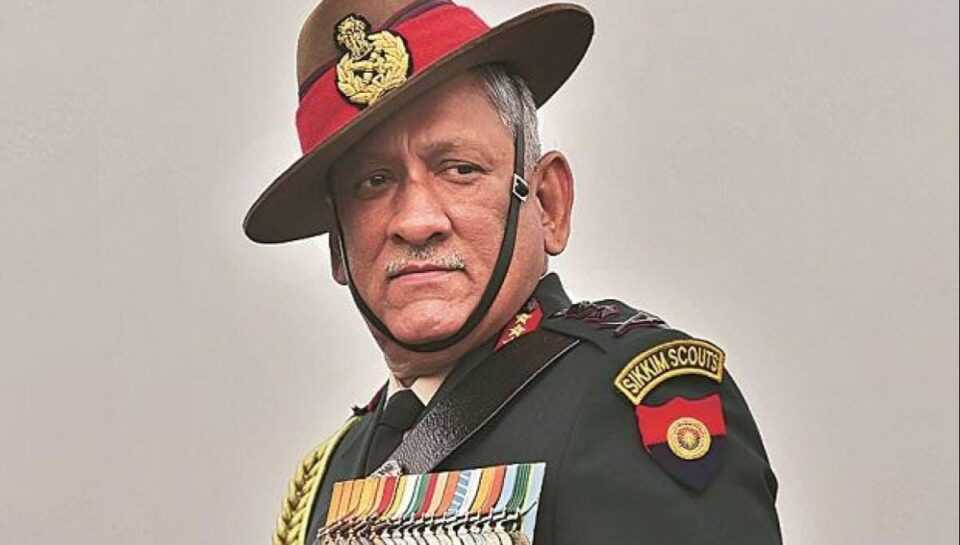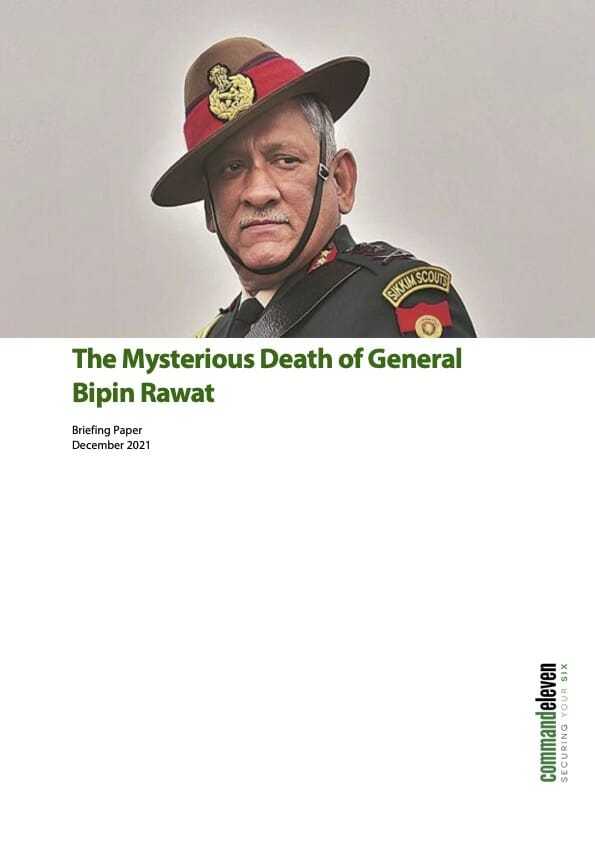Executive Summary
The first CDS of the Indian Army, Gen Rawat, has died in a helicopter crash. His death is mysterious because the controversial role of CDS was staunchly opposed by the armed forces. It was proposed in 2001 to create the post of CDS, however, due to opposition from the armed forces, defense contractors and politicians it was delayed till 2020. His untimely death has also benefited the politicians that perceived Gen Rawat as a potential political competitor.
Let’s look at this conspiracy and try to connect some dots. It may help to understand reasons behind the mysterious death of Gen Bipin Rawat.
Chief of Defense Staff (CDS)
The role of CDS is considered civilian interference in status quo because it will create synergy between the PMO, the Department of Defense and the defense procurement; this means closer scrutiny of military expenditure, the lobbying for procurement of defense platforms and failure of local platforms. The failures of Arjun tank and now Tajas jet played key role in the decision of creating the office of CDS. However, this never sat well with majority of officers of the armed forces, the defense contractors, the politicians, and the lobbyists that saw the office of CDS as a threat in continuing their business.
The CDS heads the newly formed Department of Military Affairs (DMA). It is headed by the CDS and becomes the single point of contact to the PMO. This means the CDS can implement any agenda from controversial procurement to waging a war with little interference from the armed forces. It will be at the discretion of the DMA, specifically the CDS, to share/ not share valuable insights from the armed forces to the PMO and the rest of the political leadership of the country. The unchallenged power of CDS can lead India to a war when the military is not prepared to wage a war. A powerful NSA, with a powerful CDS are a disaster in making when combined with a fascist entity in power.
Critics have raised concerns about the role of CDS because the role of this office is to support expansionism and threat to its neighbors. Here are some examples how critics saw the office of CDS:
Prabhu Chawla (Editorial Director) wrote in The New Indian Express –
Normally, the war to enlarge fiefdoms is waged by politicians and civil servants. In a rare aberration, a General has joined their ranks. Our Oliver Twist in uniform Bipin Rawat, the current Chief of Defence Staff (CDS), is a man in a hurry — a Military Machiavelli plotting and parleying to be India’s most powerful official in uniform since Independence.
Fida Hussain Malik (Defense Analyst) wrote in STRAFASIA –
Despite all the criticism from within the Indian Armed Forces, Gen Bipin Rawat enjoys the support of no less than PM Modi, since he was the one of the supporters of promoting RSS ideology in Kashmir and employment of Indian Army in great numbers. He also orchestrated the farce surgical strikes and developments thereafter. The present upheaval inside India can also be attributed to the support lent by Gen Rawat to Modi being his principal advisor on security matters alongside Ajit Doval and the Defence Minister. The appointment of CDS which was aimed to be a Boon, is grappling for not to become a Bane for the Indian Armed Forces.
Manish Tewari (Member of the Parliamentary Consultative Committee on Defense) raised a concern in Outlook –
And finally, what are the implications of the appointment of a CDS for Civil Military Relations? The last part is profoundly serious, for the singular success of India going back to 1947 has been the supremacy of the civilian leadership over the Military even in military matters.
Group Captain R Venkataraman (Retd) wrote in Deccan Herald –
it is indeed of great concern that the office of the CDS (read DMA) appears to be focussed on administrative issues such as the increase in retirement age, reduction in pension, closure of CSD canteens at peace stations, etc., that have absolutely no strategic significance.
The BJP may be the strongest party of India but its idea of CDS and half-baked reforms were not welcomed by many in the defense establishment. The botched surgical strike resulting in loss of two fighter jets didn’t help Gen Rawat either, however, Modi hoped that Gen Rawat will control the defense establishment including the armed forces.
Gen Rawat, a potential political competitor –
Was Gen Rawat a potential political competitor to Indian politicians? Yes!
Gen Rawat was son of Lt Gen Laxman Rawat; his maternal grandfather was the member of legislative assembly in Uttarakhand. A connection to India’s power corridors was part of his life from a young age. He was married into royal family from Madhya Pradesh. His wife, Madhulika Singh, was daughter of an Indian politician, Mrigendra Singh.
He was known to be a supporter of BJP and worked with Modi regime, against the wishes of the armed forces, to form the office of the CDS. Gen Rawat was popular in India and regularly commented on political affairs that was a clear diversion from norms of militaries around the world. The BJP underestimated Gen Rawat’s ambition and allowed him a free hand that resulted in resentment amongst the senior cadre of both the BJP and the military.
If a poll for popularity was conducted in India then Gen Rawat would have easily defeated Amit Shah, Rajnath Singh, Rajiv Gandhi and many others aspiring to be the next PM of India.
Gen Rawat was laying a foundation for a career in politics after his military career. He made political comments while working as army chief and then as CDS.
Srinath Raghavan noted in ThePrint –
The conduct of certain senior military officers has also shown a propensity to go beyond the thin line dividing military matters and politics: think of former Army Chief and now CDS General Rawat’s comments about a planned influx from Bangladesh that was aimed at changing Assam’s political profile, his invocation of security challenges on the eve of state elections, or his recent wading into controversy over student protests against the Citizenship Amendment Act and the National Register of Citizens.
It looks like as he Gen Rawat was groomed into the role of PM or a national leader after Modi. Amit Shah has many cases against him, and Rajnath Singh’s support is limited a few states. Rawat was an ideal candidate for a fascist party like BJP.
Beneficiaries from death of Gen Rawat –
The main beneficiaries from the demise of Gen Rawat are the opponents of CDS/ DMA, politicians and defense contractors. This is not work of some disgruntled elements, this is an organized crime carried out with help from within the military. Politicians from the BJP collaborating with defense contractors and media to ensure public sentiments are controlled. One can envisage a new issue on the horizon to divert attention from this incident in the next few days.
The beneficiaries will neutralize CDS/ DMA and more defense procurement will take place as planned. On the political side, concerned parties will get back to campaign planning and leadership will be assured that BJP will win with an aging Modi and without any succession plan in place.
The question is, who could have done it? For the first time probably, no Indian will suggest Pakistan as the culprit. This makes it very difficult for the establishment of India because now an actual investigation must be conducted; domestic scapegoat(s) will need to be found. Probably the technicians of the maintenance team or the pilots or faulty equipment will need to be blamed.
Blaming the equipment will be foolish because the Mi-17V-5 is one of the best helicopters in the market. India has one of the most recent batch of this platform. The weather and flight path were straight forward. The helicopter was flying from Sulur air base (near Coimbatore, Tamil Nadu) to Wellington, Tamil Nadu. The total distance by air is 28 miles (a map is available at the link). The total flight time could be between 10 to 20 minutes. Coonoor crash site is approx. 6 miles away from the destination Wellington. Indian military must have assigned the best pilots for this flight. This only means that investigators have a tough job at hand.
Is there a silver lining?
A successor like Gen Rawat would have encouraged further polarization of society and militarism to win elections. The madness of such gambles doesn’t end with the election campaigns because masses are not like an army that can stand down at orders. People don’t stand down, they become violent mobs and damage everything in its way.
If one looks broadly then, the Indian society and regional peace will also benefit from not having Gen Rawat at helm of affairs.



